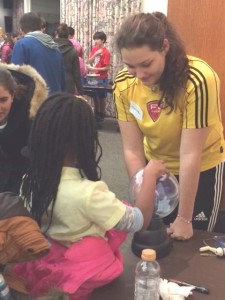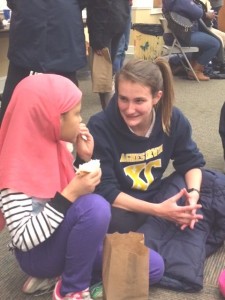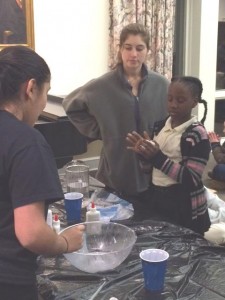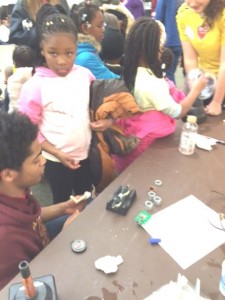 Once a week from October to April, Bryn Mawr Presbyterian Church opens its doors to roughly 150 students from neighboring schools. Bryn Mawr PC’s Tutoring Program matches 75 high school students from area public and private schools with 75 first- through fifth-graders from William Dick School of North Philadelphia. It’s a program that has been around for over 50 years and continues to go strong despite the large commitment needed from everyone involved.
Once a week from October to April, Bryn Mawr Presbyterian Church opens its doors to roughly 150 students from neighboring schools. Bryn Mawr PC’s Tutoring Program matches 75 high school students from area public and private schools with 75 first- through fifth-graders from William Dick School of North Philadelphia. It’s a program that has been around for over 50 years and continues to go strong despite the large commitment needed from everyone involved.
“Our goal is to help children with their reading and writing,” explained Marnie Bowen, the Tutoring Director, “and it’s also about developing a relationship between an inner-city child and a Main Line teen and give them an understanding of the other group.”
“This year we had the children go into see the sanctuary and see the stained-glass windows, and we had them make stained-glass windows. So in that sense there is a little bit of a church component to it, but we’ve never done anything God-related in large part because they come from a variety of different religions and a lot of our leaders are Jewish. It’s not considered a religious program.
Despite the fact that there is not a religious element to the Tutoring Program at Bryn Mawr PC, that doesn’t mean there isn’t anything being gained spiritually.
“I think all mission work – clearly this is mission work – has a spiritual component to it,” Marnie said. “Learning compassion and tolerance and even appreciating your privilege and just getting a better sense of different groups of people is all fundamental to spirituality. Giving of one’s time and showing empathy are all things that are spiritually-based.”
Some of Bryn Mawr PC’s Sunday School classes are also involved in the program. They are asked to regularly make desserts and cards for the students, thus including the Sunday Schoolers in the giving aspect of the program.
 The program was founded in 1963 by three women who worked with the Bethel Presbyterian Center in North Philadelphia to get it started. The program was coordinated with Philadelphia schools, and the Philadelphia School District Office of Volunteer Services even provided instruction and orientation for the tutors at the start of the school year. At that time, the program was for children in grades 4-7 and was created to either help improve reading skills or encourage reading to those students.
The program was founded in 1963 by three women who worked with the Bethel Presbyterian Center in North Philadelphia to get it started. The program was coordinated with Philadelphia schools, and the Philadelphia School District Office of Volunteer Services even provided instruction and orientation for the tutors at the start of the school year. At that time, the program was for children in grades 4-7 and was created to either help improve reading skills or encourage reading to those students.
Prior to the 2015-16 school year, the program was offered to two different elementary schools on two different nights. It served 50 students on each night, but as schools began to close down, only one school chose to participate and the program had to be limited to just one night. However, it was expanded to 75 students from that one particular school. Because it takes a commitment from the elementary schools – someone has to be at the school when the buses pick up the children and when they return – many are reluctant to take part in the Tutoring Program.
There is a commitment level for the parents, too, to get their students to and from the school. In order to entice the parents to allow their children to take part in the program and to put forth the effort to get their kids where they need to be, in the past the Tutoring Program has held an assembly at the school to introduce everyone to the program and the volunteers.
Funding for the Tutoring Program comes both from the church’s foundation as well as directed donations from members of the congregation. While all those who work with the program are volunteers, there are significant expenses, including all of the curriculum materials, transportation from William Dick School to the church building and back as well as a hot dinner served to the children each week.
 The Tuesday night program begins with a meal and a story, and then students are divided by grade into six classrooms where they are paired up one-on-one with their high-school tutors. By design, the tutors and the students remain constant throughout the seventh-month program. And a few of the tutors, some of whom participate in the program to fulfill a service requirement at their high school, will remain paired with their student for more than one year because of the bond that has been created.
The Tuesday night program begins with a meal and a story, and then students are divided by grade into six classrooms where they are paired up one-on-one with their high-school tutors. By design, the tutors and the students remain constant throughout the seventh-month program. And a few of the tutors, some of whom participate in the program to fulfill a service requirement at their high school, will remain paired with their student for more than one year because of the bond that has been created.
“The program is really about a relationship,” Marnie said. “The most significant piece of it is the relationship that the high-school students and the inner-city students create.”
While there is time for craft-making, and events like aerobics/dance companies and seeing-eye dogs are occasionally featured, reading and writing are the main subjects covered. One recent writing project asked the students to describe what “home” meant to them. It turned out to be a very eye-opening project.
“I didn’t know what it would look like,” she said. “The writing that these children did was really incredible. Many of them said they wanted to live in a mansion and have a swimming pool and a back yard and a back door. And the most beautiful and profound one that I heard was from a girl who said, ‘I want my windows to be heart-shaped and have bullet-proof glass.’ It was a really wonderful writing experience.”
 The hope, of course, is to reach the students who are in most need of the program. Marnie recalls one first-grader who was struggling to even sit still and had to be paired with not only a tutor but also an adult leader who took the child aside to work with him. In one year, his transformation was very noticeable.
The hope, of course, is to reach the students who are in most need of the program. Marnie recalls one first-grader who was struggling to even sit still and had to be paired with not only a tutor but also an adult leader who took the child aside to work with him. In one year, his transformation was very noticeable.
“They took him under their wing and completely individualized the entire experience for him,” Marnie said. “By the end of the year to watch the growth of this child where he couldn’t even sit still, and now he is back again this year and he’s totally engaged and knows some words, he made a significant impact on me, just witnessing him and his growth. And the commitment and the love that these tutors showed him was really remarkable. To watch that kind of growth was really rewarding.”
And that’s where Christian love, even though it may not be front and center for the students, has been felt by the many volunteers at Bryn Mawr for the past 50-plus years.
Note: For more information on Bryn Mawr PC’s Tutoring Program or for anyone wishing to donate to it, contact Carol Schmidt at CarolSchmidt@bmpc.org.
